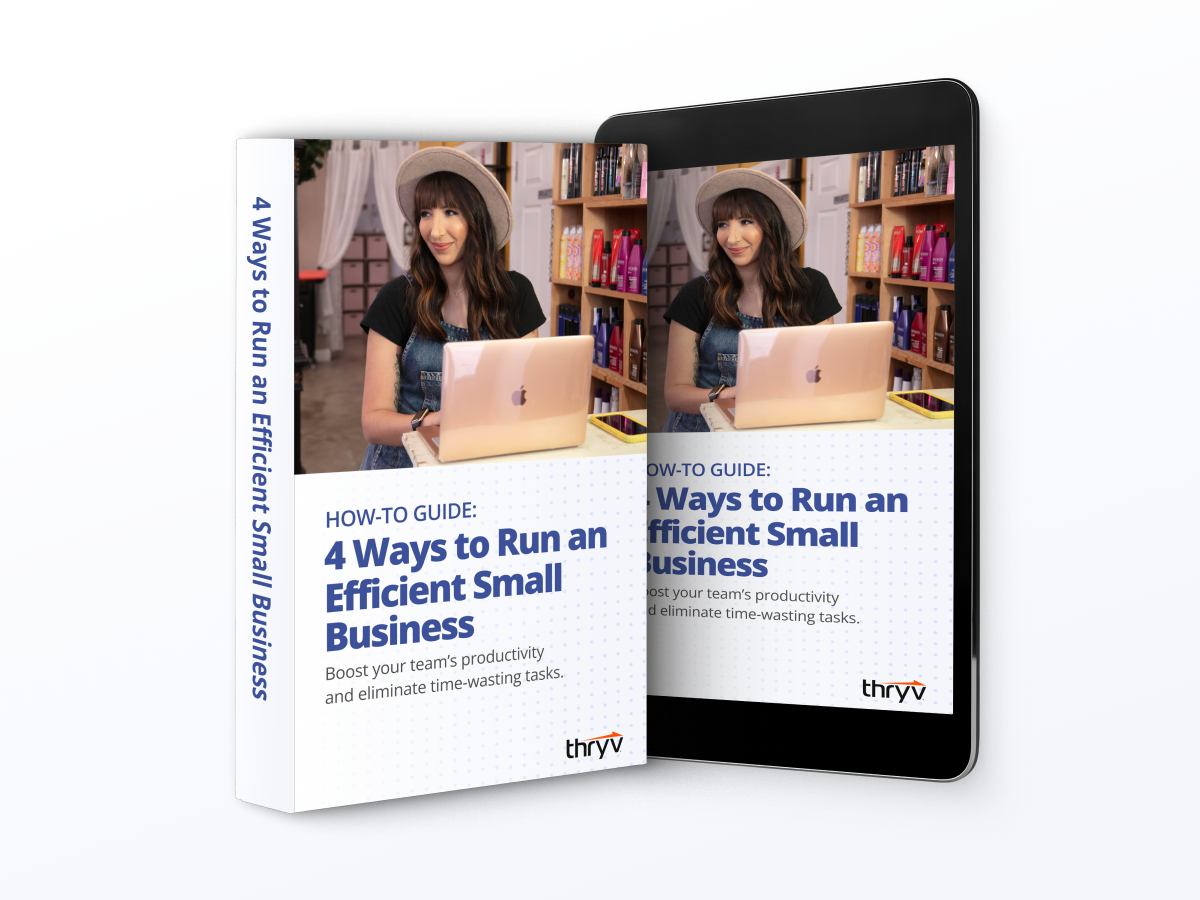Small business owners work hard, and sometimes your health comes second to getting the job done. You know it’s not ideal, but it’s part of managing a small business.
May is Mental Health Awareness Month. This is your time to step back and focus on creating healthy habits for your workspace. Not only is this good for your business, but it’s also important for your well-being.
In this post, we’ll explain what Mental Health Awareness Month is and why it’s important for small business owners. Then, we’ll provide a list of ways you can prioritize your mental and physical health at work.

Free: Thryv's Small Business Index Report
DownloadWhat is Mental Health Awareness Month?
Mental Health Awareness Month (MHAM) celebrates the importance of managing your health and recovering from mental illness. It was established in 1949 by the Substance Abuse and Mental Health Services Administration (SAMHSA) and is celebrated in May each year.
During MHAM, organizations like SAMHSA host in-person and online events that raise awareness of mental health and offer tips for small business owners on creating a healthy work-life balance.
But, why do business owners (especially) need to prioritize their mental health?
Why is mental health important for small business owners?
The World Health Organization recommends a 40-hour work week – anything over 55 hours can cause significant health risks.
According to our research, 86% of small business owners work more than 40 hours per week, and 68% want to run their business until retirement. At that rate, burnout is a significant risk for small business owners. If you plan to manage a business for the rest of your life, you’ll need to prioritize your mental and physical well-being.
That’s why we’ve curated a list of ways to celebrate mental health awareness as a small business owner.
15 Ways to Recognize Mental Health Awareness Month
Here are 15 ways to recognize Mental Health Awareness Month at work. Some will be informative, while others will be therapeutic and fun.
1. Take some time off.
We know you have a busy schedule, but if you can, take a few days for yourself this month. Relax, reset, and recharge your battery with some time away from work – especially if you haven’t gone on vacation.
You don’t have to travel or lounge around at home. Finish those incomplete home improvement projects, go to the doctor’s or dentist’s office, or catch up on whatever hobbies you’ve fallen behind on because of work.
Pro Tip: 67% of business owners believe AI will give them more personal time away from work.
2. Talk with other business owners.
If talking about work is therapeutic, find other business owners who share similar interests. You can vent about your workload or a tricky project that you’re tackling, and listen to stories from other entrepreneurs who are dealing with similar problems. You might even walk away with some ideas for improving the workflow of your own business.
3. Review your daily routine.
As a small business owner, it is easy to get into a routine of overworking. After all, you are the driving engine of your business, and its success depends on how much you put into it.
But, that doesn’t mean you can burn the candle at both ends. You have to think long-term and consider your production over time.
Now is an excellent time to optimize your business. Many free AI tools, like Reclaim, integrate with your calendar, and improve your communication and workflow. Give some of these tools a try, as they can help you be just as — if not more — productive with fewer resources.
Pro Tip: 95% of business owners who use AI say it reduces pressure on them and/or their staff at work.
4. Take more breaks.
No, eating lunch for five minutes while standing over a workbench does not constitute a break. A break should detach you from work and allow your mind to reset. Studies have found that employees who take breaks are more focused when they return to work, leading to increases in production.
If you must take out your phone ona break, do something fun — scroll on social media, play Fruit Ninja, or check the score of the game. Let your brain wander for a moment and then return to work. You’ll find you’re more productive and feel better about the rest of your day.
5. Use mental health services.
Mental health services like therapy and life coaching benefit small business owners who are constantly under pressure to get things done. These services are no different from visiting the dentist or getting your car inspected by a mechanic. The sky doesn’t have to be falling if you want to talk to someone about the day-to-day challenges you’re facing. These are spaces to brainstorm ways to solve these issues, so they don’t have a negative impact on you or your business.
6. Spend time with friends and family.
It’s important to step away from work, and friends and family are great resources for helping you do that. They’ll listen to you vent or take your mind off work with an activity or conversation. Not only will this help you maintain a healthy relationship with your loved ones, but it will also improve your business. Your friends will want you to succeed, so when new obstacles arise, don’t be afraid to lean into whatever support system you have.
7. Download an app.
There are plenty of apps that can help you manage your mental and physical health. For example, I use MyFitnessPal to track my movement. I also use a meditation app called Headspace, which offers three-minute coaching sessions for grounding yourself and improving your focus. These apps are designed to fit your busy schedule so you can keep health and wellness on your mind while juggling other tasks.
Here’s an example of what the MyFitnessPal app looks like:

8. Try to move your body a little more.
Exercise isn’t just for bodybuilders and pro athletes – moving your body however you can is an asset to the mind, too.
Research from the National Library of Medicine has found that individuals who regularly make time for movement can experience the following benefits:
- Better sleep
- Improved physical endurance
- Stress relief
- Better mood
- Increased mental awareness
- Lower cholesterol
If you can, my recommendation is to join a recreational group that can help you make movement fun. Look for ones that are flexible and organized around your working schedule. Team sports are a great way to stay active and make new friends, even if you can’t make every game or play every position.

The Guide to Running an Efficient Small Business
We’re sharing our expert tips to help you boost productivity, eliminate time-wasting tasks, and more in this free guide.
9. Attend an online seminar.
If you want to learn more about managing your mental health, consider attending a seminar during Mental Health Awareness Month. One seminar we found was the Annual Older Adult Mental Health Awareness Day Symposium. It’s a free session that highlights the need for mental health resources for older people.

If that’s not what you’re looking for, the SAMHSA’s website has a list of events you can attend this year.
10. Join a support group.
Whether they’re work-related or not, support groups are excellent communities for managing mental health issues. They’re safe spaces where you can talk about your problems and exchange notes or advice with other people facing similar obstacles.
There are also support groups specifically for small business owners. Check social media for ones in your area or join one online via forums like Reddit.
11. Go outside.
Remember recess? How awesome was recess? You went outside, played kickball, fell off the jungle gym – the world was your oyster.
You still deserve recess. Take a little time out of your day to go outside and do something for yourself. Go for a walk, do a bit of gardening, or just lie in the grass with your dogs. Whatever it is, take time to reset, and you’ll feel better when you return to work.
12. Post on social media.
If you want to show your support for Mental Health Awareness Month at work, post about it on your social media pages. Show what you’re doing to celebrate and why your business is raising awareness of this cause. Not only will this support mental health awareness, but it can also grow your following.

13. Sponsor an event.
Another action that you can take is sponsoring an event. It doesn’t have to be anything big. It could just be a walk or picnic – something that gets people together and talking about mental health.
One event that I found was a Stop the Stigma Awareness brunch which features a panel of doctors speaking about mental health. Not only will there be informative speeches and giveaways, but small business owners are encouraged to attend and sell their products. Look for similar events in your area that you can sponsor or participate in as a vendor.
14. Reset expectations for communication.
If you’re constantly on your phone getting barraged with new messages, then maybe it’s time to reset your communication expectations with your customers. For example, if you want to immediately respond to every email that lands in your inbox, there are ways to automatically send them a notification to let customers know that you will respond in 24 hours. This message gives them a clear timeline while reducing some of the pressure on your end to respond right away.
Pro Tip: Communication software can centralize messages from customers in one place.
15. Catch up on some sleep.
Sleep shouldn’t be optional. In fact, several studies have found employees with poor sleeping habits are more likely to decline in performance and have “poor interpersonal relationships.” In other words, when you don’t sleep, you’re less productive and tend to be a grouch.
Sleep isn’t time wasted. Prioritize good sleeping habits, and you’ll see it pay off during the workday.
Managing Your Mental Health at Work
As a small business owner, you have a good work ethic. After all, your business depends on it.
But, you can’t burn yourself out from overworking. Prioritizing your mental and physical well-being can help you continue to be successful over time. Use this month to start practicing a healthy work-life balance, and you might not only perform better, but feel better about it, too.

The Guide to Running an Efficient Small Business
We’re sharing our expert tips to help you boost productivity, eliminate time-wasting tasks, and more in this free guide.









